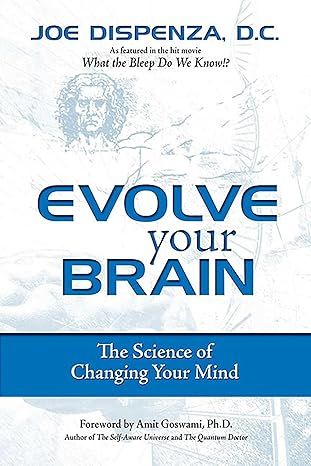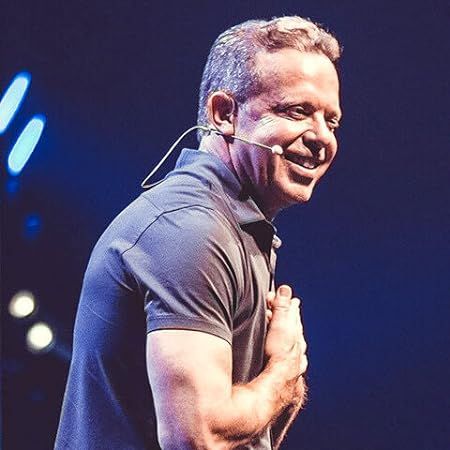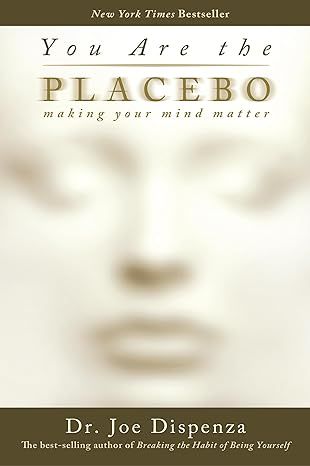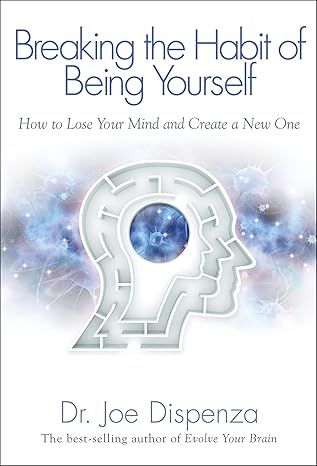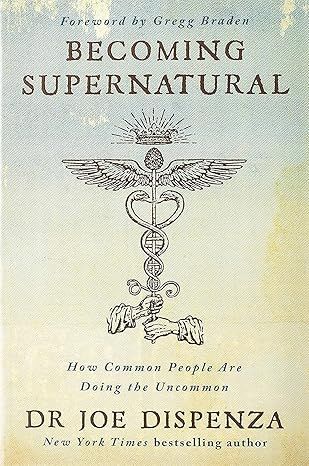Evolve Your Brain: The Science of Changing Your Mind
4.7
-
2,343 ratings
Why do we keep getting the same jobs, taking on the same relationships, and finding ourselves in the same emotional traps?
Dr. Joe Dispenza not only teaches why people tend to repeat the same negative behaviors, he shows how readers can release themselves from these patterns of disappointment.
With the dynamic combination of science and accessible how-to, Dispenza teaches how to use the most important tool in ones body and life—the brain. Featured in the underground smash hit of 2004, "What the Bleep Do We Know!?," Dispenza touched upon the brain's ability to become addicted to negative emotions. Now, in his empowering book Evolve Your Brain he explains how new thinking and new beliefs can literally rewire one's brain to change behavior, emotional reactions, and habit forming patterns.
Most people are unaware of how addicted they are to their emotions, and how the brain perpetuates those addictions automatically. In short, we become slaves to our emotional addictions without even realizing it. By observing our patterns of thought, and learning how to 're-wire the brain' with new thought patterns, we can break the cycles that keep us trapped and open ourselves to new possibilities for growth, happiness and emotional satisfaction.
Key Features
A radical approach to changing addictive patterns and bad habits.Based on more than twenty years of research.Bridges the gap between science, spirituality and self-help—a formula that has proven success.Easy to understand and written for the average reader.
Kindle
$14.99
Available instantly
Audiobook
$0.00
with membership trial
Hardcover
$11.97
Paperback
$16.39
Ships from
Amazon.com
Payment
Secure transaction
ISBN-10
0757307655
ISBN-13
978-0757307652
Print length
528 pages
Language
English
Publisher
Health Communications Inc
Publication date
October 21, 2008
Dimensions
6 x 1.4 x 9 inches
Item weight
1.4 pounds
Product details
ASIN :
0757307655
File size :
9190 KB
Text-to-speech :
Enabled
Screen reader :
Supported
Enhanced typesetting :
Enabled
X-Ray :
Enabled
Word wise :
Enabled
Editorial reviews
Review
Dr. Joe Dispenza's book, Evolve Your Brain, will help you use your power to choose and to change. Read this book, use its ideas in your life, and realize your potential.-- "Amit Goswami, Ph.D."
From the Inside Flap
It took one moment to change Joe Dispenza's life forever.
A car sent him toppling off his bike, causing multiple fractures to his vertabrae. Several doctors said his only hope of walking again was to fuse some of the vertebrae in an operation that would leave him with a lifetime of pain and limited mobility.
But as a chiropractor, Dispenza knew enough about spinal health and his own post-accident physical state to take a remarkable risk: he refused the operation and, along with a careful therapeutic program, literally thought his way to healing. Nine months later, he was able to walk and function as well as he had before the accident, and he credits a large amount of that recovery to the power of his own mind.
This incredible experience spurred Joe on to learn about this most important tool that we all possess—the brain—and he passes that potent knowledge on to you. He explores how the brain learns, how it processes information, and, when it isn't stimulated enough by new experiences, how it can become addicted to comfortable, familiar patterns.
Every time we think a thought or feel an emotion, the brain sends chemicals throughout the body that reproduce that feeling, often giving us a physical reaction. Through prolonged repetition, self-limiting thoughts and feelings can become habitual—producing mindsets such as unworthiness and attracting negative experiences—yet we can still crave them, even when they don't feel good.
But all this can change—and Joe Dispenza will show you how to do it. Step by step, he'll walk you through the structures of the brain, how your thoughts and emotions become hardwired in the brain, how to recognize the patterns you want to change, and finally, how to create new, positive habits that will not only change your life, but also change you—into the person you've always wanted to be.
About the Author
Joe Dispenza, DC, studied biochemistry at Rutgers University in New Brunswick, New Jersey. He received his Doctor of Chiropractic Degree at Life University in Atlanta, Georgia. Dr. Dispenza's postgraduate training and continuing education have been in neurology, neurophysiology, and brain function. Dr. Dispenza has authored several scientific articles on the close relationship between brain chemistry, neurophysiology, and biology, and their roles in physical health. Dr. Dispenza has a chiropractic practice in Rainier, Washington.
Sean Runnette, an Earphones Award-winning narrator, has also directed and produced more than two hundred audiobooks, including several Audie Award winners. He is a member of the American Repertory Theater company and has toured the United States and internationally with ART and Mabou Mines. His television and film appearances include Two If by Sea, Cop Land, Sex and the City, Law & Order, the award-winning film Easter, and numerous commercials.
Read more
Sample
Excerpt. © Reprinted by permission. All rights reserved.
But strange that I was not told
That the brain can hold
In a tiny ivory cell
God's heaven or hell.
―Oscar Wilde
I invite you to have a single thought, any thought. Whether your thought was related to a feeling of anger, sadness, inspiration, joy, or even sexual arousal, you changed your body. You changed you. All thoughts, whether they be 'I can't,' 'I can,' 'I'm not good enough,' or 'I love you,' have similar measurable effects. As you sit casually reading this page, not lifting a single finger, bear in mind that your body is undergoing a host of dynamic changes. Triggered by your most recent thought, did you know that suddenly, your pancreas and your adrenal glands are already busy secreting a few new hormones? Like a sudden lightning storm, different areas of your brain just surged with increased electrical current, releasing a mob of neurochemicals that are too numerous to name. Your spleen and your thymus gland sent out a mass e-mail to your immune system to make a few modifications. Several different gastric juices started flowing. Your liver began processing enzymes that were not present moments before. Your heart rate fluctuated, your lungs altered their stroke volume, and blood flow to the capillaries in your hands and feet changed. All from just thinking one thought. You are that powerful.
But how are you capable of performing all of those actions? We can all intellectually understand that the brain can manage and regulate many diverse functions throughout the rest of the body, but how responsible are we for the job our brain is doing as CEO of the body? Whether we like it or not, once a thought happens in the brain, the rest is history. All of the bodily reactions that occur from both our intentional or unintentional thinking unfold behind the scenes of our awareness. When you come right down to it, it is startling to realize how influential and extensive the effects of one or two conscious or unconscious thoughts can be. For example, is it possible that the seemingly unconscious thoughts that run through our mind daily and repeatedly create a cascade of chemical reactions that produce not only what we feel but also how we feel? Can we accept that the long-term effects of our habitual thinking just might be the cause of how our body moves to a state of imbalance, or what we call disease? Is it likely, moment by moment, that we train our body to be unhealthy by our repeated thoughts and reactions? What if just by thinking, we cause our internal chemistry to be bumped out of normal range so often that the body's self-regulation system eventually redefines these abnormal states as normal, regular states? It's a subtle process, but maybe we just never gave it that much attention until now. My wish is that this book will offer a few suggestions for managing your own internal universe.
Since we are on the subject of attention, now I want you to pay attention, become aware, and listen. Can you hear the hum of the refrigerator? The sound of a car passing by your home? A distant dog barking? How about the resonance of your own heart beating? Just by shifting your attention in those moments, you caused a power surge and voltage flux of electricity in millions of brain cells right inside your own head. By choosing to modify your awareness, you changed your brain. Not only did you change how your brain was working moments before, but you changed how it will work in the next moment, and possibly for the rest of your life.
As you return your attention to these words on this page, you altered blood flow to various parts of your brain. You also set off a cascade of impulses, rerouting and modifying electrical currents to different brain areas. On a microscopic level, a multitude of diverse nerve cells ganged up chemically to 'hold hands' and communicate, in order to establish stronger long-term relationships with each other. Because of your shift in attention, the shimmering three-dimensional web of intricate neurological tissue that is your brain is firing in new combinations and sequences. You did that of your own free will, by changing your focus. You quite literally changed your mind.
As human beings, we have the natural ability to focus our awareness on anything. As we will learn, how and where we place our attention, what we place our attention on, and for how long we place it ultimately defines us on a neurological level. If our awareness is so mobile, why is it so hard to keep our attention on thoughts that might serve us? Right now, as you continue to concentrate and read this page, you might have forgotten about the pain in your back, the disagreement you had with your boss earlier today, and even what gender you are. It is where we place our attention and on what we place our attention that maps the very course of our state of being.
For example, we can, in any given moment, think about a bitter memory from our past that is only tattooed in the intimate folds of our gray matter and, like magic, it comes to life. We also have the option of attending to future anxieties and worries that do not readily exist until they are conjured up by our own mind. But to us, they are real. Our attention brings everything to life and makes real what was previously unnoticed or unreal.
Believe it or not, according to neuroscience, placing our attention on pain in the body makes pain exist, because the circuits in the brain that perceive pain become electrically activated. If we then put our full awareness on something other than pain, the brain circuits that process pain and bodily sensations can be literally turned off―presto, the pain goes away. But when we look to see whether the pain is gone for good, the corresponding brain circuits once again activate, causing us to feel the discomfort return. And if these brain circuits repeatedly fire, the connections between them become stronger. Thus by paying attention to pain on a daily basis, we are wiring ourselves neurologically to develop a more acute awareness of pain perception, because the related brain circuits become more enriched. Your own personal attention has that much of an effect on you. This could be one explanation to how pain, and even memories from our distant past, characterize us. What we repeatedly think about and where we focus our attention is what we neurologically become. Neuroscience finally understands that we can mold and shape the neurological framework of the self by the repeated attention we give to any one thing.
Everything that makes us up, the 'you' and the 'me'―our thoughts, our dreams, our memories, our hopes, our feelings, our secret fantasies, our fears, our skills, our habits, our pains, and our joys―is etched in the living latticework of our 100 billion brain cells. By the time you have read this far in the book, you have changed your brain permanently. If you learned even one bit of information, tiny brain cells have made new connections between them, and who you are is altered. The images that these words created in your mind have left footprints in the vast, endless fields of neurological landscape that is the identity called 'you.' This is because the 'you,' as a sentient being, is immersed and truly exists in the interconnected electrical web of cellular brain tissue. How your nerve cells are specifically arranged, or neurologically wired, based on what you learn, what you remember, what you experience, what you envision for yourself, what you do, and how you think about yourself, defines you as an individual.
You are a work in progress. The organization of brain cells that makes up who you are is constantly in flux. Forget the notion that the brain is static, rigid, and fixed. Instead, brain cells are continually remolded and reorganized by our thoughts and experiences. Neurologically, we are repeatedly changed by the endless stimuli in the world. Instead of imagining nerve cells as solid, inflexible, tiny sticks that are assembled together to make up your brain's gray matter, I invite you to see them as dancing patterns of delicate electric fibers in an animated web, connecting and disconnecting all the time. This is much closer to the truth of who you are.
The fact that you can read and comprehend the words on this page is due to the many interactions you have had throughout your life. Different people taught you, instructed you, and essentially changed your brain microscopically. If you accept this notion that your brain is still changing as you read these pages before you, you can easily see that your parents, teachers, neighbors, friends, family, and culture have contributed to who you are presently. It is our senses, through our diverse experiences, that write the story of who we are on the tablet of our mind. Our mastery is being the fine conductor of this remarkable orchestra of brain and mind; and as we have just seen, we can direct the affairs of mental activity.
Now, let's change your brain a little further. I want to teach you a new skill. Here are the instructions: Look at your right hand. Touch your thumb to your pinky finger, and then touch your thumb to your index finger. Next, touch your thumb to your ring finger, and then touch your thumb to your middle finger. Repeat the process until you can do it automatically. Now do it faster and make your fingers move more rapidly without mistake. Within a few minutes of paying attention, you should be able to master the action.
To learn the finger movements well, you had to rise out of your resting state, from relaxing and reading to a heightened state of conscious awareness. Voluntarily, you perked up your brain a little; you increased your level of awareness by your intentional free will. To succeed in memorizing this skill, you also had to increase your brain's level of energy. You turned up the dimmer switch to the light bulb in your brain that is constantly on, and it got brighter. You became motivated, and your choice to do this made your brain turn on.
Learning and performing the activity required you to amplify your level of awareness. By increasing blood flow and electrical activity to different areas in your brain, you could stay more present with what you were doing. You kept your brain from wandering to any other thought so that you could learn a new action, and that process took energy. You changed the way the arrangement of millions of brain cells fired in diverse patterns. Your intentional act took will, focus, and attention. The end result is that you are once again neurologically changed, not only by thinking a thought but also by demonstrating an action or a new skill. In a moment, I want you to close your eyes. This time, instead of physically demonstrating the finger exercise, I want you to practice doing that same action in your mind. That is, remember what you did just moments before and mentally touch each finger the way I asked you to earlier: thumb to pinky finger, thumb to index finger, thumb to ring finger, and thumb to middle finger. Mentally rehearse the activity without physically doing it. Do it a few times in your mind, and then open your eyes.
Did you notice that while you were practicing in your mind, your brain seemed to imagine the entire sequence just as you actually did it? In fact, if you paid full attention to what you were rehearsing in your mind's eye by focusing on mentally practicing those finger actions, you fired the same set of nerve cells in the same part of your brain as if you were actually doing them. In other words, your brain did not know the difference between your doing the action or your remembering how to do the action. The act of mental rehearsal is a powerful way you can grow and mold new circuits in your brain.
Recent studies in neuroscience demonstrate that we can change our brain just by thinking. So ask yourself: What exactly do you spend most of your time mentally rehearsing, thinking about, and finally demonstrating? Whether you consciously or unconsciously fabricate your thoughts and actions, you are always affirming and reaffirming your neurological self as 'you.' Keep in mind that whatever you spend your time mentally attending to, that is what you are and what you will become. My hope is that this book will help you to understand why you are the way you are, how you got this way, and what it takes to change who you are through your intentional thoughts and actions.
You may ask at this point, What is it that allows us to voluntarily modify how the brain works? Where does the 'you' exist, and what allows you to turn on and off different brain circuits that then make you aware or unaware? The 'you' I'm talking about lives in a part of the brain called the frontal lobe, and without the frontal lobe, you are no longer 'you.' In evolution, the frontal lobe has been the last part of the brain to develop, just behind the forehead and right above the eyes. You hold the image of yourself in the frontal lobe, and what you hold in this special place determines how you interact in the world and perceive reality. The frontal lobe controls and regulates other, older parts of the brain. The frontal lobe navigates your future, controls your behavior, dreams of new possibilities, and guides you throughout life. It is the seat of your conscience. The frontal lobe is evolution's gift to you. This brain region is most adaptable to change and is the means by which you evolve your thoughts and actions. My desire is that this book helps you to use this newest, most recent part of your brain's anatomy to reshape your brain and your destiny.
©2008. All rights reserved. Reprinted from Evolve Your Brain by Joe Dispenza. No part of this publication may be reproduced, stored in a retrieval system or transmitted in any form or by any means, without the written permission of the publisher. Publisher: Health Communications, Inc., 3201 SW 15th Street , Deerfield Beach , FL 33442.
Read more
About the authors
Joe Dispenza
A New York Times best-selling author, researcher, lecturer, and corporate consultant, Dr Joe Dispenza has developed a practical formula to help people transform their lives.
Dr Joe’s mission unifies complex branches of science in an approachable way – focused on proven research, “Stories of Transformation” testimonials, and the scientific data behind spontaneous remissions. Inspired by the latest findings in neuroscience, psychoneuroimmunology, epigenetics, and quantum physics, his work integrates essential knowledge about the mind-body connection – which teaches people how to heal various health conditions and make significant changes in their lives.
Since 2010, he has partnered with renowned scientists and universities – including University of California San Diego, Harvard University, Stanford University, and others – to perform extensive research on the effects of meditation on the brain and body.
During research studies conducted at his seven-day advanced retreats around the world, Dr Joe and his team have gathered more than 20,000 brain scans (quantitative QEEG and fMRI) and more than 10,000 heart-rate variability (HRV) measurements. Their findings demonstrate the effects of sustained, elevated states of mind and emotions – and how self-regulation produces significant effects on heart and brain function, immune response, and overall mind-body health.
Working with thousands of novice and advanced meditators in these studies, Dr Joe and his team have analyzed a database of 3,000 blood metabolites collected before and after the retreats. Using pre- and post-samples, they have studied epigenetic and microbiome changes, a gross spectrum of urine metabolites, and the healing effects of breast milk.
Dr Joe’s team also has conducted extensive research on cancer, Alzheimer’s disease, and neurogenesis – as well as the effects of advanced meditators’ natural resistance to the COVID-19 virus; isolating a specific protein that strengthens the immune responses. The team also has measured how intention can directly influence gene expression and protein regulation. They have measured changes in cellular mitochondrial function, endogenous opioids, neurotransmitters, telomere length, and variations in bioactive cellular metabolic particles.
Research studies conducted at their retreats also include speech analysis to better understand the language of transformation and transcendental experiences; studies on twins and closely bonded pairs; the use of random-event generators to measure changes in collective consciousness; and the biological effects of in-person as well as Remote Coherence Healing™ sessions.
Dr Joe and his team are expanding their reach to include communities in need around the world. They’ve worked with more than one thousand children to study the effects of meditation in a school setting; veterans – including U.S. Navy SEALs – and others suffering with post-traumatic stress disorder; inmates at prisons in the U.S. and Mexico; indigenous tribes in the U.S.; and children diagnosed with Autism Spectrum Disorder. Teaching self-regulation through heart and brain coherence, they’re bringing healing to some of the world’s most vulnerable populations.
Read more
Reviews
Customer reviews
4.7 out of 5
2,343 global ratings

Daniel Benor, MD
5
This book is a good read as well as being very informative.
Reviewed in the United States on November 28, 2016
Verified Purchase
Joe Dispenza is a holistic chiropractor. He came into very deep understandings of the mind-body connection early in his career, when he suffered multiple spinal fractures in being knocked off his bike by a speeding car. He was given very strong advice from several neurosurgeons to have extensive surgery, with warnings that without surgical interventions he was likely to end up paralyzed from the chest down. Despite these dire predictions, he refused surgery and chose to use conservative physical measures and intensive meditative and imagery exercises. His personal success was a big boost to him in furthering his holistic career.
Dispenza has gone on to help many other people deal with their physical problems through mind-body interventions. He shares much that is helpful to those who want to know how to help themselves, from his rich experiences in these approaches.
The people I spoke with who experienced a spontaneous remission believed that a higher order or intelligence lived within him or her. Whether they called in the ir divine, spiritual, or subconscious mind, they accepted that an inner power was giving them life every moment, and that it knew more than they, as humans, could ever know. Furthermore, if they could just tap into this intelligence, they could direct it to start working for them.” (p. 39)
He explains when we change our views of the world and our relationships with the world, we can change our physical states of being. I find it peculiar, however that Dispenza prefers the term ‘spontaneous remission’ to describe recoveries from medically incurable problems. In my view, these are truly ‘remarkable recoveries.’ (Benor, web reference)
Dispenza presents clear explanations of the theoretical basis for his approaches.
If you think that our brain – being the site of us, or our consciousness– has the capacity to change possibility into actuality, think again. According to quantum physics, the brain itself consists of quantum possibilities before we measure it, before we observe with it. If we, our consciousness, were a brain product, we would be possibilities as well, and our “coupling” with the object would change neither the object nor us (our brain) from possibility to actuality. Face it! Possibility coupled to possibility only makes a bigger possibility.
The paradox only thickens if you think of yourself dualistically– you as a nonmaterial dual entity, not bound by quantum laws and separate from your brain. But if you are nonmaterial, then how do you interact with your brain, with which you have not a thing in common? This is dualism, a philosophy intractable as a science.
There is a third way of thinking, and this one leads to a paradigm shift. Your consciousness is the primary fabric of reality, and matter (including the brain and the object you are observing) exists within this fabric as quantum possibilities. Your observation consists of choosing from the possibilities the one facet that becomes the actuality of your experience.
Read more
88 people found this helpful
Mickey Brix
5
Take control of your own existence.
Reviewed in the United States on May 19, 2022
Verified Purchase
This book is eye opening on so many levels but mainly because it gives you the tools to create the life you want by helping you become the person you wish to be. It supports the concepts through science as well as real life examples of what we would have (prior to reading the book) called extraordinary. It is very heavy in the science of the mind at times and if, you’re like me, that is slower reading. However, it’s necessary in order to truly understand not only the why, but the how.
Read more
10 people found this helpful
Novella Wellington
5
Learned so much.
Reviewed in the United States on August 31, 2023
Verified Purchase
If you REALLY want to know what’s going on in your head, and in other people’s heads, this is a great book. It really gets into detail and isn’t for casual reading. When you get finished, you’ll understand why it is so hard for people to change. And you’ll find out why they don’t bother. Plus it’s exciting to know you can have a great future for yourself with a little bit of practice.
Read more
26 people found this helpful
Top Joe Dispenza titles
View allSimilar Books
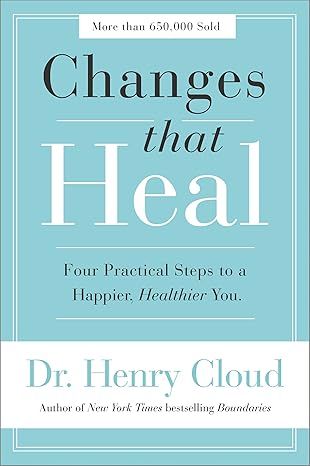
Changes That Heal: Four Practical Steps to a Happier, Healthier You
4.8
-
2,937
$0.99
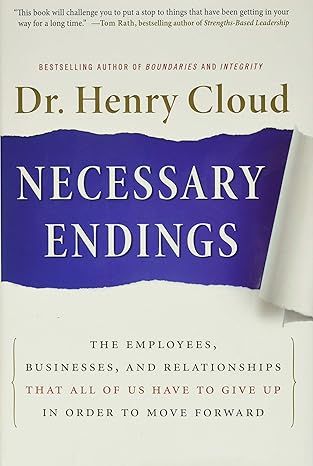
Necessary Endings: The Employees, Businesses, and Relationships That All of Us Have to Give Up in Order to Move Forward
4.7
-
2,598
$0.99
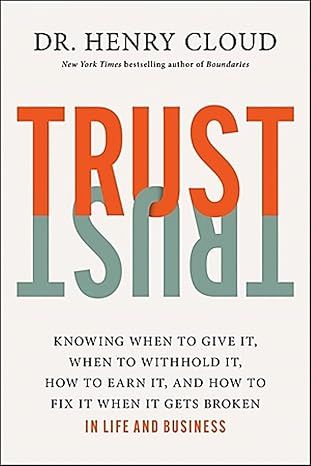
Trust: Knowing When to Give It, When to Withhold It, How to Earn It, and How to Fix It When It Gets Broken
4.8
-
626
$0.99

Boundaries Updated and Expanded Edition: When to Say Yes, How to Say No To Take Control of Your Life
4.7
-
23,877
$0.99

Braving the Wilderness: The Quest for True Belonging and the Courage to Stand Alone
4.6
-
14,403
$0.99
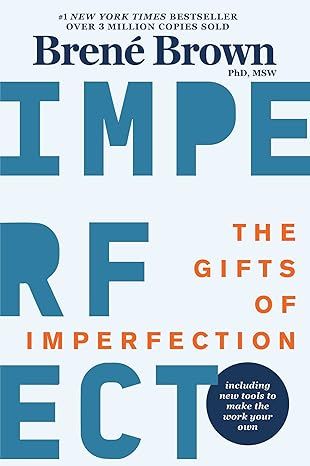
The Gifts of Imperfection: 10th Anniversary Edition: Features a new foreword and brand-new tools
4.7
-
42,318
$0.99
Best sellers
View all
The Tuscan Child
4.2
-
100,022
$8.39

The Thursday Murder Club: A Novel (A Thursday Murder Club Mystery)
4.3
-
155,575
$6.33

Sapiens: A Brief History of Humankind
4.6
-
140,302
$13.49

The Butterfly Garden (The Collector, 1)
4.3
-
88,556
$9.59

Things We Hide from the Light (Knockemout Series, 2)
4.4
-
94,890
$11.66

The Last Thing He Told Me: A Novel
4.3
-
154,085
$2.99

The Perfect Marriage: A Completely Gripping Psychological Suspense
4.3
-
143,196
$9.47

The Coworker
4.1
-
80,003
$13.48

First Lie Wins: A Novel (Random House Large Print)
4.3
-
54,062
$14.99

Mile High (Windy City Series Book 1)
4.4
-
59,745
$16.19

Layla
4.2
-
107,613
$8.99

The Locked Door
4.4
-
94,673
$8.53
